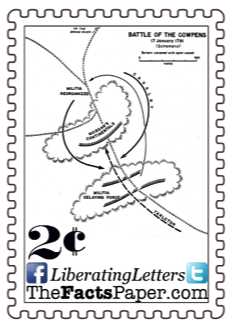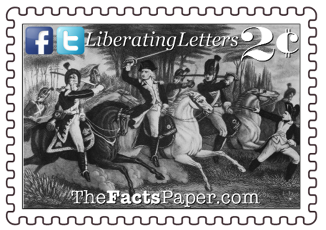
The sleep deprived and undernourished British soldiers, already exhausted from battling an hour, were no match for the well-rested and disciplined Continental Army forces. It was too much for the Red Coats, whose ranks quickly began to break down. Many surrendered where they stood while others ran from the battlefield. Tarleton tried to continue with a small cavalry unit, wanting to retrieve his two cannons seized by the Americans. However, once Tarleton grasped the reality that they were surrounded, he began his retreat.
Colonel William Washington, a Patriot officer and General Washington’s second cousin, raced after Tarleton, ready to strike him with a saber, proclaiming, “Where is now the boasting Tarleton?” A British Cornet, or lower officer, in the cavalry approached Washington, gun drawn, yet was shot by Washington’s trumpeter. Tarleton took the moment of mayhem to shoot Washington’s horse, allowing him to escape unharmed. Nevertheless, Tarleton left disheartened as Morgan turned his certain victory into a devastating defeat in just over an hour.
However, the miracles were not over yet.
Tarleton rode directly to Cornwallis’ camp to inform him of the battle. Legend records that Cornwallis placed the tip of his sword in the ground and leaned so heavily on it at word of the defeat that the sword broke in two. As over 800 Red Coats had been captured during the campaign, Cornwallis immediately began pursuit to recover them. Time being of the essence, Cornwallis abandoning much needed supply wagons as they hindered the chase. Hearing the British were coming, Morgan headed north, meeting with Greene as they all raced to make it back to Virginia before Cornwallis could catch up.
With hundreds of miles ahead of them, they needed a miracle. Cornwallis was not far behind, reaching the Catawba River just two hours after Morgan. However, as if on cue, an abrupt storm swelled the waters, preventing the British from crossing the rushing river immediately.
The British again caught up to Greene and Morgan as they reached the Yadkin River in North Carolina. However, another flash flood impeded the Red Coats from crossing as the Patriots fled on the other side towards the Dan River. The Americans just finished navigating through that river as another burst of water surged its banks, for a third time hindering the British advancement.
One flash flood could be excused as luck. Two would be written off as a coincidence. However, three consecutive flash flood escapes is nothing less than Divine Providence, (see God's Divine Providence) and many at the time saw it as such.
British Commander Henry Clinton wrote:
“Here the royal army was again stopped by a sudden rise of the waters, which had only just fallen (almost miraculously) to let the enemy over, who could not else have eluded Lord Cornwallis’ grasp, so close was he upon their rear.”
General George Washington wrote the following to Rev. William Gordon, minister in the Black Robed Regiment (see The Forgotten Founding Father, Who Among You Is With Me?, and Give 'Em Watts, Boys):
"We have...abundant reasons to thank Providence for its many favorable interpositions in our behalf. It has at times been my only dependence, for all other resources seemed to have failed us."
A week later, on March 15, 1781, Greene meet Cornwallis at the Battle of Guilford Court House. Greene retreated after two hours of battle, giving Britain a tactical victory. Nevertheless, it was not before killing, wounding or capturing 25 percent of the Cornwallis’ forces. These events turned the tides of the war towards the Patriots. Within seven months, Cornwallis surrendered to General Washington at Yorktown, thus ending the American Revolution. (see On A Mislead And A Prayer)
Liberty, many dismiss the Bible, claiming Moses didn’t part the Red Sea, the walls at Jericho did not come tumbling down, and David did not slay Goliath with a slingshot and a rock. On the surface, these events do seem impossible. But no more improbable than the Patriots eluding the Red Coats not once, not twice, but three times because of flash floods. Too many people cannot see God’s hand in the world, primarily because they don’t want to. Unfortunately, we can often miss it too, because we allow our focus to go elsewhere.
The pilgrims ventured to the shores of the New World in search of the New Jerusalem. As such, they brought their faith and trust in the Lord with them. (see Thanks Be To God, Jamestown: A City Upon A Hill, and Eluding The Old Deluder) They firmly believed:
“Blessed is the nation whose God is the LORD, the people he chose for his inheritance.” Psalm 33:12
Unfortunately, America has vigorously abandoned this principle, especially over the last 100 years since the Progressive movement. (see Sanger And Eugenics And Socialism, Oh, My, Labor Day's Communist Foundation, and The Birth Of A Nation) We are greatly suffering because of it. However, God told us exactly what to do.
“If my people, who are called by my name, will humble themselves and pray and seek my face and turn from their wicked ways, then I will hear from heaven, and I will forgive their sin and will heal their land.” 2 Chronicles 7:14
Regardless of where the country goes, Liberty, continue to strive for and be that “City upon a Hill” that Jesus calls us to be, as you may be the only light shining in someone’s life that gets them across the river before the flood waters come, cutting them off from the Promised Land.
That’s my 2 cents.
Love,
Mom
January 17, 2018
Dear Liberty,
General George Washington was once again staring defeat in the face. The Red Coats, led by General Charles Cornwallis in the South, were delivering defeat after defeat to the Continental Army. Washington needed a strong leader if the Patriot militia had any chance of standing against the British army and the Loyalist colonists supporting them. The Patriots did not have an abundance of experienced forces. However, what they did have was the will and determination of backcountry Americans.
Washington selected Nathanael Greene on October 14, 1780, to command the small band of just 2,300 men, of which less than 1,000 were regular army. (see Pivot Points, Your Country Is At Stake, Sergeant Molly, and On A Mislead And A Prayer) Greene realized the limitations of his men and made an unprecedented decision. He split up his army. Calling Daniel Morgan out of retirement, Greene promoted him to Brigadier General, and sent him west with a detachment of 600 Patriots. Morgan started his military career in the French and Indian War, where he earned the nickname, “The Old Wagoner”. (see Bulletproof) He accompanied General Andrew Lewis to confront Lord Dunmore following the Battle of Point Pleasant, the unofficial first battle of the Revolutionary War. (see The Forgotten Battle) In addition to participating in several major battles, he spent the entire year of 1776 as a prisoner of war following the Battle of Quebec. (see A Tale Of Two Patriots and Pivot Points) An experienced and hardy soldier, Morgan’s skill proved to be monumental.
Morgan’s mission was to head west of the Catawba River in South Carolina to gather supplies and boost morale of the citizens following their recent losses. Once at his destination, other militias met up with their small group of soldiers.
On the British front, Cornwallis prepared to continue his assault on the Carolinas. However, Morgan now threatened those plans due to his location. In addition, Cornwallis received incorrect news that Morgan intended to strike the British fort at Ninety Six, South Carolina. This prompted Cornwallis on January 2, 1781, to send 26-year-old Lieutenant Colonel Banastre Tarleton to stop Morgan.
Tarleton, though young, already enjoyed several major military victories. However, his reputation turned infamous following the Battle of Waxhaws, where he and his men unceremoniously killed American Patriots after they surrendered, earning him the name “The bloody butcher”. Upon reaching Ninety Six, Tarleton discovered Morgan was not there. Regardless, he continued on after Morgan anyway. As Tarleton closed in, Morgan headed north with his men. The pursuit continued for two weeks until Morgan reached the Broad River. Reluctant to cross a flooded river while being pursued, Morgan decided to stay and fight in the local grazing pasture known as “Hannah’s Cowpens”. Obsessed with reaching Morgan, Tarleton pushed his men forward at 3:00am without rest and nourishment after receiving word of Morgan’s location.
Moments before sunrise on January 17th, Tarleton reached the Cowpens and attacked immediately. Little did Tarleton know Morgan anticipated his confidence and aggressiveness, tailoring a defense specifically to counter the British boldness. Morgan placed three separate fronts, about 150 yards apart each. The first line contained skirmishers, who promptly eliminated fifteen British dragoons, or cavalrymen. As the remaining dragoons retreated, Tarleton ordered his infantry and reserve cavalry without assessing Morgan’s layout. The Americans began to fall back to the second line of militiamen as they continued to fire. This second group was directed to perform two volleys before falling back to the third line of regulars.
Stunned and confused by the American’s defense tactics, the Red Coats misread their withdraw as a full blown retreat, therefore breaking ranks in a headlong attack. As a result, they ran straight into the experienced regulars of the Continental Army at point-blank range. In addition, further American soldiers circled the battlefield, surrounding the dumbfounded British.
MORGAN'S MIRACLE

